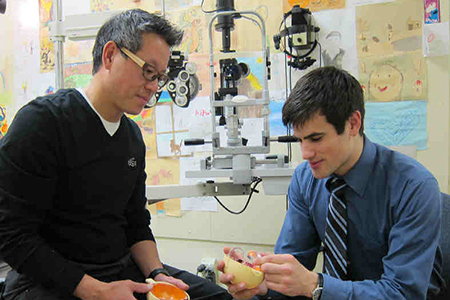News about the sluggish economy and the high unemployment rate has all of us a little scared. Well, here’s some good news if you’re thinking of majoring in engineering: Of the top 10 highest-paying college majors, seven of them are in engineering!*
So, engineering isn’t just a college major; it’s a job and a profession— and one in demand and well paid! Engineers have the problem-solving skills to fix a problem, but more than that, they are responsible for creating solutions to problems that we aren’t even aware of yet. Bigger, faster, better—engineers put their problem-solving abilities to the test to make the world a better place. Some engineers can even rewrite history! (See sidebar on the sinking of the Titanic.)
Check out the engineering degrees you can earn online.
Of course like any major or occupation you may choose you should like what you do. Fortunately there’s a wide variety of engineering concentrations to choose from: aeronautical chemical computer environmental mechanical electrical petroleum and more. Engineers are used in almost every industry.
Who Are Engineers Anyway?
“(Engineers are) people who want to make things better faster stronger simpler smarter quicker quieter greener and more efficient,” shares Julie Ulseth, director of marketing enrollment services at Kettering University (MI).
Job security? Engineering has it! “Engineers are some of the most sought-after professionals in our society today because they imagine the future and make it happen,” explains Matt McLendon, director of communications at Georgia Tech. “[There are] plenty of opportunities for a career that can be personally rewarding and can make a major contribution to the improvement of people’s lives and the advancement of our nation,” says E. Manos Maragakis dean of the College of Engineering at the University of Nevada Reno. “Examples [of contributions] include engineering applications related to all aspects of infrastructure national security renewable energy natural disaster response and medical applications.” With engineering you’ve got plenty of options!
It’s not all work and no play. “There is always something new because technology opens doors and minds every second of every day. There are fields of study and new industries that don’t even exist yet that will come into being because of engineers!,” says Ulseth.
But as exciting as the field of engineering can be it isn’t the right fit for every student. Engineers undergo rigorous training to prepare for the demands of this fast-paced career.
High School: An Early Peek Into Engineering
Right now is the perfect time to start preparing for your future in engineering. What can you do while you are in high school? Take relevant classes participate in pre-college summer programs and speak with actual engineers!
You already know that math and science are crucial components of an engineering degree. “Embrace math don’t be afraid of it,” urges Ulseth. Don’t take the easy way out in high school. Get in there and take those high-level courses. Not only will this help give you a strong foundation when the real challenge of college math and science classes kick in but college admission committees love to see you taking advanced courses (yes even in your senior year).
As with any major there are always interdisciplinary elements to it—and engineering is no exception. “Take an appropriate sequence of courses in mathematics physics and chemistry,” urges Maragakis. But math and science aren’t the only areas that you should focus on. Think physics chemistry and even public speaking! It might sound a little strange but engineers don’t just sit around and create things they have to convince others of the importance of their findings. Get comfortable speaking in public and sharpen those writing skills. They will come in handy later.
If you’re not sure about engineering but want to get an early taste a pre-college program might help you decide.
At the United States Coast Guard Academy for example students who have completed their junior year of high school can attend the one-week Academy Introduction Mission (AIM). In addition to giving rising seniors a taste of military life the program has a strong focus on engineering.
Under the tutelage of Academy cadets and the engineering faculty students participate in the Academy Robotics on the Water (AROW) program. Using Styrofoam™ gears and robotic parts teams build a cutter to do mock Coast Guard missions. Their boats simulate search and rescue incidents counter-drug situations navigation helicopter operations and pollution response. It must be pretty fun; the Academy estimates that about one-third of the AIM attendees make up almost half of the following year’s class!
Networking: Get Connected
Don’t let high school pass you by before you take a proactive position regarding your future! Find an after-school job that can introduce you to the work of an engineer or check out an internship. At the very least talk to practicing engineers to find out what it’s really like. From the guidance counselor to the school library there are many places that can help you find out more about engineering. Check out career days for high school students or browse the Web to see what engineers are currently doing.
Consider pre-college summer pro-grams. They allow you to actually experience what an engineer does before you graduate high school. Depending on the type of program you’ll have hands-on experience solving real engineering problems while earning college credit.
3/2 and co-op programs
Engineering colleges frequently give their students new ways to sharpen and hone their natural problem-solving abilities by way of 3/2 programs or co-op programs. Otherwise referred to as a double degree undergraduate program engineering majors can snag two degrees from two different schools within the same college—in a five-year period! How does it work? Students study for three years at one school before switching and studying two years at another. The prize? Two bachelor’s degrees one from each school and usually two different kinds (like a B.S. and B.A.).
Co-op programs are another cool concept that’s relatively common in engineering schools. These programs give students real-world experience while still in college. For the most part your school will have connections with various companies who want students to finish actual engineering projects. These thesis projects will help pad your resume and prepare you for what happens on the job.
Hot Trends
So where exactly is engineering headed? Two of the most talked about industries are aerospace and eco-engineering.
Although ecological engineering is a broad-spectrum term it might be easiest to think of it in terms of trying to design build and maintain structures with as little impact as possible on the environment. Ecological engineers generally try to conserve non-renewable energy use recycled or reclaimed materials and respect plant and animal communities.
At the University of Alaska Fairbanks (UAF) for example engineering students compete against other schools in the national Annual Clean Snow Machine Challenge. Scores are based on design considerations like zero emissions internal combustion noise and acceleration. In 2011 UAF won for best design and most-improved snowmobile.
The engineering student mix is also changing. For example the University of Notre Dame is seeing increased enrollments of women and students from underrepresented racial and ethnic groups. “We are seeing strong need in the electrical engineering and computer-related fields,” says Cathy Pieronek, assistant dean for academic affairs at Notre Dame “as well as in fields that have applications to bioengineering and the energy-related field.”
“The University of Nevada Reno is home to the biggest and most versatile earthquake simulation facility in the nation–and one of the biggest in the world,” says Maragakis. “Our earthquake engineering program has developed a solid international reputation and has influenced state-of-the art earthquake-resistant design in the nation and around the world.”
Talk about the opportunity to shake things up in the world of engineering!
Does a need for engineers translate into jobs after graduation? “Approximately 70 percent of our graduates go on to work in the industry—many in leadership development programs that lead to management positions and advanced degrees in engineering or business,” explains Pieronek. “About 20 percent of our graduates go directly to graduate or professional school. The remainder engage in service whether through ROTC the Peace Corps Teach for America or other similar programs.”
Shop Around
If you’re thinking that engineering is the career for you take the time to visit a few schools. When you are thinking about visiting colleges make sure that the school you choose has programs and activities that will complement your major. In other words: What will your future school do for you? No matter where your interests lie you can be sure to find an engineering school that fits your aspirations.
Engineering isn’t for everyone but if it’s the right field for you your school will help you focus your natural talents and abilities. You’ll learn how to think and respond like an engineer —and you’ll likely earn some of the highest starting salaries of any college graduates. Building a rocket is fun but building a bank account for doing what you love is even better!
Joey Jackson Holobowski is a freelance writer in DeMotte Ind.
*Source: National Association of Colleges and Employers Spring 2011 Salary Survey



